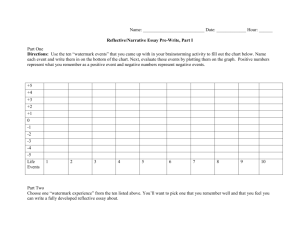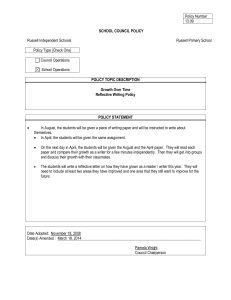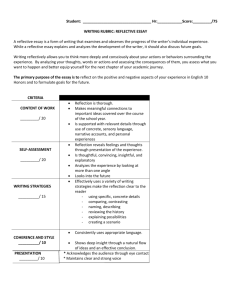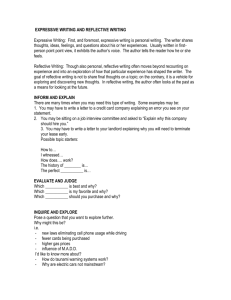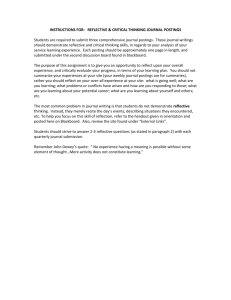Initial Reflective Essay, “Technology Equals Progress?,” RESC 098
advertisement
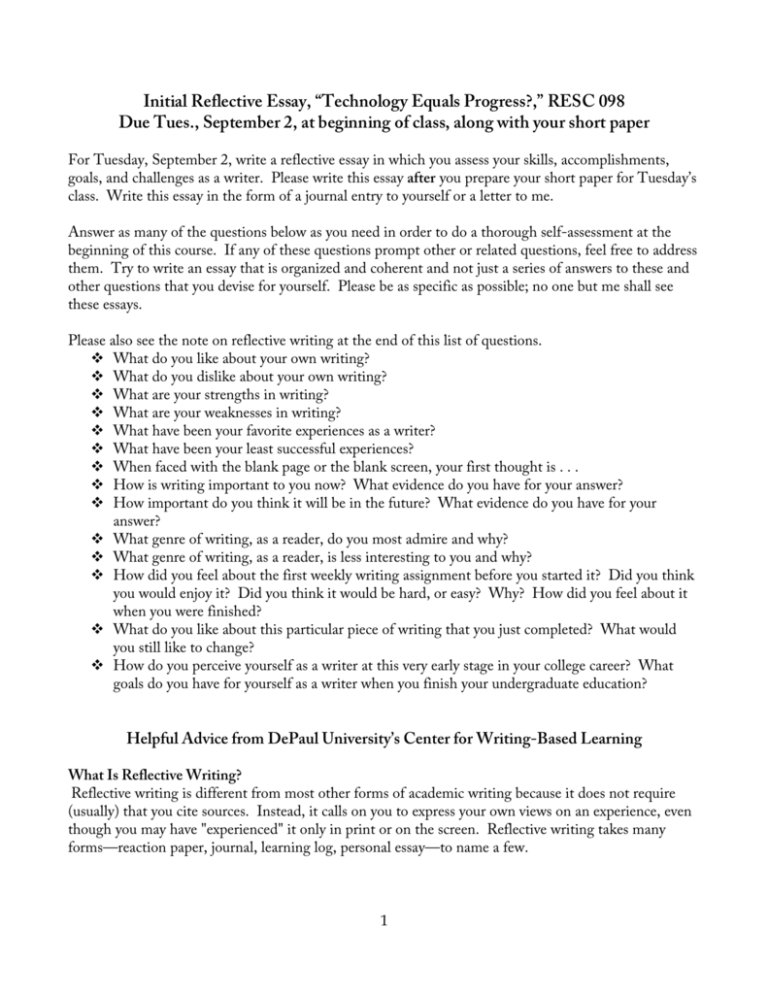
Initial Reflective Essay, “Technology Equals Progress?,” RESC 098 Due Tues., September 2, at beginning of class, along with your short paper For Tuesday, September 2, write a reflective essay in which you assess your skills, accomplishments, goals, and challenges as a writer. Please write this essay after you prepare your short paper for Tuesday’s class. Write this essay in the form of a journal entry to yourself or a letter to me. Answer as many of the questions below as you need in order to do a thorough self-assessment at the beginning of this course. If any of these questions prompt other or related questions, feel free to address them. Try to write an essay that is organized and coherent and not just a series of answers to these and other questions that you devise for yourself. Please be as specific as possible; no one but me shall see these essays. Please also see the note on reflective writing at the end of this list of questions. What do you like about your own writing? What do you dislike about your own writing? What are your strengths in writing? What are your weaknesses in writing? What have been your favorite experiences as a writer? What have been your least successful experiences? When faced with the blank page or the blank screen, your first thought is . . . How is writing important to you now? What evidence do you have for your answer? How important do you think it will be in the future? What evidence do you have for your answer? What genre of writing, as a reader, do you most admire and why? What genre of writing, as a reader, is less interesting to you and why? How did you feel about the first weekly writing assignment before you started it? Did you think you would enjoy it? Did you think it would be hard, or easy? Why? How did you feel about it when you were finished? What do you like about this particular piece of writing that you just completed? What would you still like to change? How do you perceive yourself as a writer at this very early stage in your college career? What goals do you have for yourself as a writer when you finish your undergraduate education? Helpful Advice from DePaul University’s Center for Writing-Based Learning What Is Reflective Writing? Reflective writing is different from most other forms of academic writing because it does not require (usually) that you cite sources. Instead, it calls on you to express your own views on an experience, even though you may have "experienced" it only in print or on the screen. Reflective writing takes many forms—reaction paper, journal, learning log, personal essay—to name a few. 1 Rather than ask, "what is reflective writing," you might better ask "what is reflective thinking?" Writing, after all, is the process of making your thinking visible on paper. Consider the root word "reflect," meaning "to give back an image." To think reflectively means to give a second (or third, or fourth . . .) look at your own experience in order to analyze and learn from what took place. One purpose of reflective writing is to help you learn. The process of writing forces your brain to take action on the information, consolidating it and fixing it in long-term memory. That is why note-taking while reading is recommended, and why journaling is often a requirement for a practicum or internship. Another purpose is to communicate your insights to others, either to enlighten them or to demonstrate what you have learned. Reflective thinking fosters metacognition: that is, the ability to analyze and understand your own thought processes. Metacognition enables you to develop strategies for acting purposefully towards a goal. It is the opposite of unproductive random behavior—trial and error—that dooms you to repeat mistakes and prevents you from applying successful strategies from the past. Characteristics of Reflective Writing Reflective writing for an academic assignment, regardless of its purpose or setting, can be identified by these characteristics: • It is purposeful. Reflective writing does not mean jotting down scraps of thoughts as they pop into your head. That might work for a personal diary, but not for reflective writing with an academic purpose. Start with a goal: What do you want to accomplish, to learn, to improve, to demonstrate, to understand better? • It is personal. It explores a relationship between the writer and something else. • It is perceptive. Reflective writing is not merely describing or telling a story. It requires higher order thinking skills: o Analysis. What are the separate and underlying components of the situation, process, or argument you are reflecting on? What are the causes and effects? o Synthesis. How do those components relate to or react to one another? How are they different when considered together rather than apart? What would happen if you introduced a change? How can you summarize? What have you learned? o Evaluation. What is your attitude towards the subject? What is your degree of subjectivity? How have you been affected? What part will you accept or reject? How might you perceive or act differently in the future? • It is polished. Although you may not use research sources, reflective writing must meet the standards of precision, clarity, conciseness, and correctness of any other styles of formal writing. o Plan to write and revise. Do not hand in your first draft. o Use formal punctuation, use complete sentences, insert page numbers and headings when appropriate, and maintain margins and paragraph indents. o Read the paper back to yourself, aloud. When you write from a personal perspective, it is easy to lose sight of your audience. Check for clear organization and graceful transitions. o Check your spelling. 2
